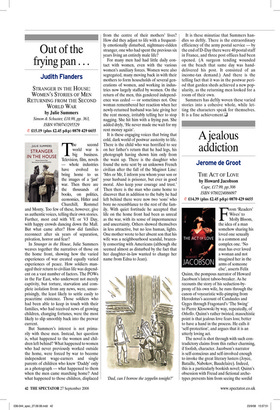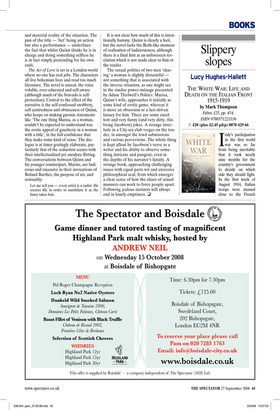A jealous addiction
Jerome de Groot
THE ACT OF LOVE by Howard Jacobson Cape, £17.99, pp.306 ISBN 9780224086097 ✆ £14.39 (plus £2.45 p&p) 0870 429 6655 From ‘Readers’ Wives’ to Molly Bloom, the idea of a man somehow sharing his loved one sexually is a common and complex one. ‘No man has ever loved a woman and not imagined her in the arms of someone else’, asserts Felix Quinn, the pompous narrator of Howard Jacobson’s latest taboo-breaker. As he recounts the story of his seduction-byproxy of his own wife, he runs through the canon of voyeuristic wife-pimping from Herodotus’s account of Candaules and Gyges through Fragonard’s ‘The Swing’ to Pierre Klosowski by way, repeatedly, of Othello. Quinn’s rather twisted, masochistic point is that jealous love fears loss; better to have a hand in the process. He calls it ‘self-protection’, and argues that it is an utterly loving act.
The novel is shot through with such contradictory claims from this rather charming, if foolish, character. Jacobson’s narrator is self-conscious and self-involved enough to invoke the great literary lusters (Joyce, Bataille, Nabokov, Baudelaire). Indeed, this is a particularly bookish novel; Quinn’s obsession with Freud and fictional archetypes prevents him from seeing the sordid and material reality of the situation. The pun of the title — ‘Act’ being an action but also a performance — underlines the fact that whilst Quinn thinks he is in charge and doing something selfless he is in fact simply pretending for his own ends.
The Act of Love is set in a London world where no one has real jobs. The characters all live bohemian lives and read too much literature. The novel is unreal, the voice voluble, over-educated and self-aware (although much of the bravado is selfprotection). Central to the effect of the narrative is the self-confessed snobbery, self-centredness and obtuseness of Quinn, who keeps on making gnomic statements like ‘The one thing Marisa, as a woman, couldn’t be expected to understand was the erotic appeal of gaucherie in a woman with a title’, in the full confidence that they make some kind of sense. The dialogue is at times gratingly elaborate, particularly that of the seduction scenes with their intellectualised yet anodyne flirting. The conversations between Quinn and his younger counterpart, Marius, are ludicrous and excessive in their invocations of Roland Barthes, the purpose of art, and sensuality:
Let me tell you — every artist is a sadist. He creates life in order to annihilate it as the fancy takes him.
It is not clear how much of this is intentionally hammy. Quinn is clearly a fool, but the novel lacks the Roth-like moment of realisation of ludicrousness, although there is a final hint at an unforeseen revelation which is not made clear to him or the reader.
The sexual politics of two men ‘sharing’ a woman is slightly distasteful — not something that is associated with the inverse situation, as one might see in the similar power-ménage presented by Adam Thirlwell’s Politics. Marisa, Quinn’s wife, approaches it initially as some kind of erotic game, whereas it is more an obsession or a lust-driven lunacy for him. There are some excellent and very funny (and very dirty, this being Jacobson) jokes. A strange interlude in a City sex club verges on the tender, in amongst the lewd submissions and various perversions. The whole thing is kept afloat by Jacobson’s verve as a writer and his ability to observe something intricate and pungent, even in the depths of his narrator’s fatuity. A strange book, approaching challenging issues with equal parts wit and excessive philosophical zeal, from which emerges a clear sense of how the chaos of sexual manners can work to force people apart. Following jealous instincts will always end in lonely emptiness. q











































































 Previous page
Previous page